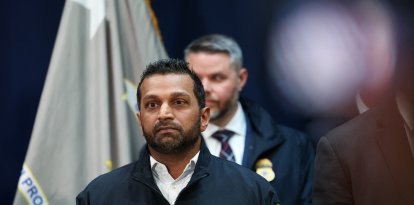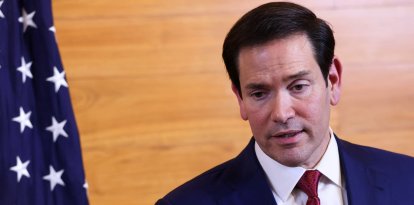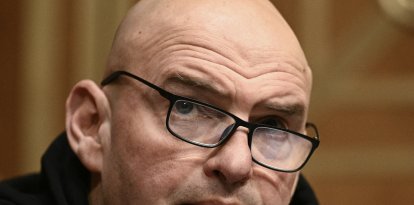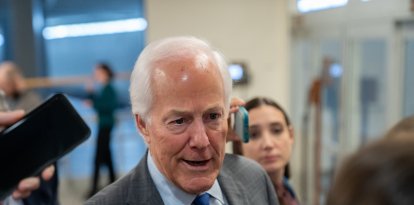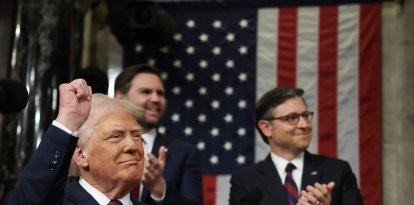Marco Rubio, the Hispanic who will make history at the State Department
The Republican senator is a political wunderkind. This is the success story of the son of Cuban exiles who has reached the highest position in American diplomacy and who will surely have great influence on the future of the United States and Latin America.
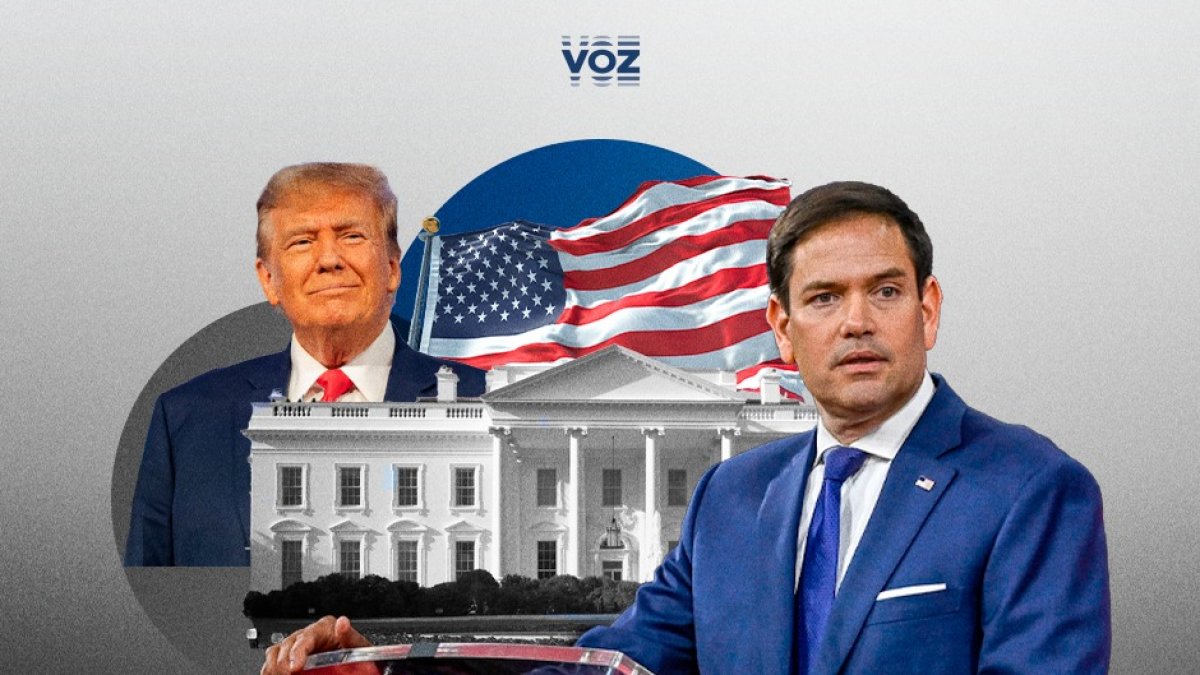
Voz Media
After several days of speculation it has been confirmed that the Florida Senator, Marco Rubio, has been chosen by Donald Trump to be his Secretary of State. "He will be a strong Advocate for our Nation, a true friend to our Allies, and a fearless Warrior who will never back down to our adversaries," Trump said in a statement.
After an election in which the Hispanic vote was so important, and President Trump managed to go down in history as the Republican with the highest percentage of the Hispanic vote in the Party's history, the nomination of this son of Cuban exiles is also a great victory for millions of Hispanics who put their trust in the Republican Party and who expect real solutions to their problems.
Rubio has always been something of a political wunderkind, successfully accomplishing everything he undertakes. For years he has been instrumental in guiding the Republican Party on Latin America policy and also on the threat posed by China and Iran to the United States. Therefore, his nomination is perhaps one of the strongest and it is very clear why President Trump choose him for this position.
Rubio has not only made history by becoming the first Hispanic to reach the highest post in American diplomacy, but we will surely see him making history in terms of what he is going to accomplish on international policy. Rubio has made it clear that we must be strong with the enemies of the United States and the dictatorships in the region, he has been forceful in his support for Israel, that Iran and China are enemies of the United States and should be treated as such. Of course, his position on Latin America is also crucial, in his long career as a public servant he has pushed for sanctions and maximum pressure on dictatorships in the region.
The 52-year-old senator is not only one of the proudest members of the Cuban community, but also enjoys tremendous popularity among Hispanics in general. He has been in the Senate for three terms and has established himself as the most influential Republican on international policy. During the Trump administration, Rubio practically led Latin America policy, making great strides in pressuring the Cuban dictatorship and the tyranny of Nicolás Maduro in Venezuela, earning the respect and affection of millions of Hispanics.
Rubio also has an impeccable presence on camera, he expresses himself with clarity and forcefulness in the media, his youthful vigor and his energetic and strong character are very desirable characteristics for the position he will occupy. However, it is not only about his presence and what he projects but also about his proven effectiveness, and to that end, he has been declared the most influential Republican in the Senate and the second most effective.
Another of his great strengths is that he is respected by both sides. While he enjoys wide acceptance among conservatives, he also has a large number of bipartisan bills on his record, and his influence expands to the full Senate.
Rubio is a very strong player and may go down in history as one of the best and most influential Secretaries of State. His history is extraordinary and showcases his character and intelligence. His career has been full of enormous successes, he has always achieved what he set out to do. The only time he failed to win was precisely because Trump defeated him in the race to be the Republican Party's presidential nominee in 2016.
Let's take a look at the success story of the new Secretary of State.
A brilliant political career
Rubio has a great story of achievement, coming from a Cuban family that started from scratch in this country and has seen their son rise from Calle Ocho in Miami to Capitol Hill in Washington. Growing up, his father worked as a bartender and his mother was a hotel maid.
At just 21 years old in Miami, Rubio decided to support Lincoln Diaz-Balart's campaign for Congress and sign up as a volunteer. The senator has said that summer he spent his days learning Miami politics from the ground up. After that, what was to come for him would be a successful career.
In January 2000, at age 28, he became a member of the Florida House of Representatives. In 2005, Governor Jeb Bush anointed him as Speaker of the State House, the first Cuban American to obtain that position. He remained as Speaker from 2006 to 2008.
At only 39 years old, and facing skepticism from much of the Republican Party, in 2010 Rubio managed to become senator after defeating the popular Florida governor Charlie Crist in an outcome that took many by surprise.
In 2015 he decided to launch his presidential campaign, but withdrew from the race after losing the Republican primary in Florida against Donald Trump. In 2019 he returned to the Senate, and in 2022 he was re-elected for the third time.
Rubio is considered one of the Republicans with the highest level of leadership. In fact, according to GovTrack, he is the Republican with the highest level of leadership which was measured by how often other members of Congress co-sponsor his bills.
He is also considered one of the most effective, according to the Center for Effective Legislation (CEL) at the University of Virginia and Vanderbilt University, Rubio is the second most effective senator within the Republican Party, as measured by his success in enacting laws and bills.
Political positions
According to GovTrack Rubio ranks 15th in right-wing political ideology. On economics, he supports cutting taxes and recognizes the need for a balanced budget.
On the topic of abortion, he has always been pro-life. On issues of gender ideology, he has opposed the teaching of such ideas in schools and has introduced bills to prohibit state funding to hospitals that promote radical agendas.
One of the fields in which he is best known is in matters of international politics, not only regarding Latin America, an area which for decades he has been one of the most influential politicians, but also on issues concerning China and its influence in the United States.
Rubio led the Senate in authorizing and passing the Safe Equipment Act. This act prevents the government from issuing new licenses to Chinese companies such as Huawei and ZTE, which allow Xi Jinping's dictatorship to spy on Americans.
His influence on foreign policy
Senator Rubio has had so much influence on foreign policy that during the Trump administration he was described as the "virtual secretary of state for Latin America." Rubio is one of the senators who has most strongly opposed the Castro regime in Cuba. During the Trump administration he worked hand in hand with the president to reverse the concessions given to the dictatorship under the Obama administration. Among his best known achievements is the Cuban Military Transparency Act which became the basis for preventing financial transactions that benefit the dictatorship's military.
Rubio enjoys high popularity and support not only within the Cuban community, but in general among Hispanics, as he has opposed all communist dictatorships in the region, always strongly condemning their actions and presenting projects to try to weaken those regimes.
On Venezuela, Rubio has been one of the senators who has most forcefully condemned the tyranny of Nicolás Maduro, was perhaps the key figure in the United States recognizing Juan Guaidó as interim president and disavowed Maduro after the 2019 sham elections in Venezuela. Rubio was also co-author of the "VERDAD" law, a bipartisan law that allocated $400 million for humanitarian aid to Venezuelan refugees.
Both in the White House and on Capitol Hill, as well as in the media, Senator Rubio is one of the most decisive figures in terms of foreign policy. He is the one who for years has explained to the Republican Party and many media outlets what is happening in Latin America. Now, from his new position as Secretary of State, we will surely see him leading the United States to retake the role of strong leader and appease the conflicts that have been unleashed during the Biden-Harris administration. Latin America also welcomes the news that one of the strongest opponents of tyrannies in the region is coming to the State Department.














